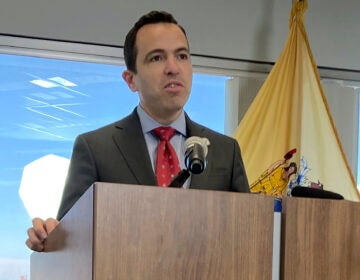Commission recommends 100 ways N.J. can help returning citizens adjust to life back home
Speakers at a Tuesday press conference in Trenton highlighted the recommendations, which involved issues of addiction, health care, jobs, housing and the law.

Prisoners make clothing for the New Jersey Department of Corrections. (Emma Lee/WHYY)
A new report says New Jersey can do better when it comes to offering reentry services to former prisoners.
The report from the New Jersey Reentry Services Commission, which included advocates, legislators, and a former governor, listed 100 recommendations for the state to help people transition back into daily life.
“We as a society have created obstacles to them that can and should go away,” said attorney Larry Lustberg, who co-chaired the commission.
Speakers at a Tuesday press conference in Trenton highlighted the recommendations, which involved issues of addiction, health care, jobs, housing and the law.
Some formerly incarcerated people failed to get licenses for cosmetology or construction jobs because of their criminal records. Others struggled to wipe out old municipal court tickets or pay child support debts that grew while behind bars.
A doctor said the state should offer more addiction treatment options and screen people in prison for Hepatitis B and C, which are treatable.
Former New Jersey Gov. Jim McGreevey, who works with the New Jersey Reentry Corporation, said many of the report’s recommendations would be affordable to the state.
“The overwhelming bulk of the recommendations are merely addressing gaps in service,” he said.
Haywood Gandy, who spent 23 years in prison in New Jersey for crimes including armed robbery and kidnapping, said reentry services were critical in helping him transition into life back home.
Gandy said staff at the N.J. Reentry Corp. helped him with simple tasks that he didn’t learn in prison, like how to turn on and operate a computer.
“I don’t know if I would be here [without those services]. I don’t know if I would have been able to swim in these rapidly flowing waters,” Gandy said. “For me, 20 years, these waters have changed.”
WHYY is your source for fact-based, in-depth journalism and information. As a nonprofit organization, we rely on financial support from readers like you. Please give today.




